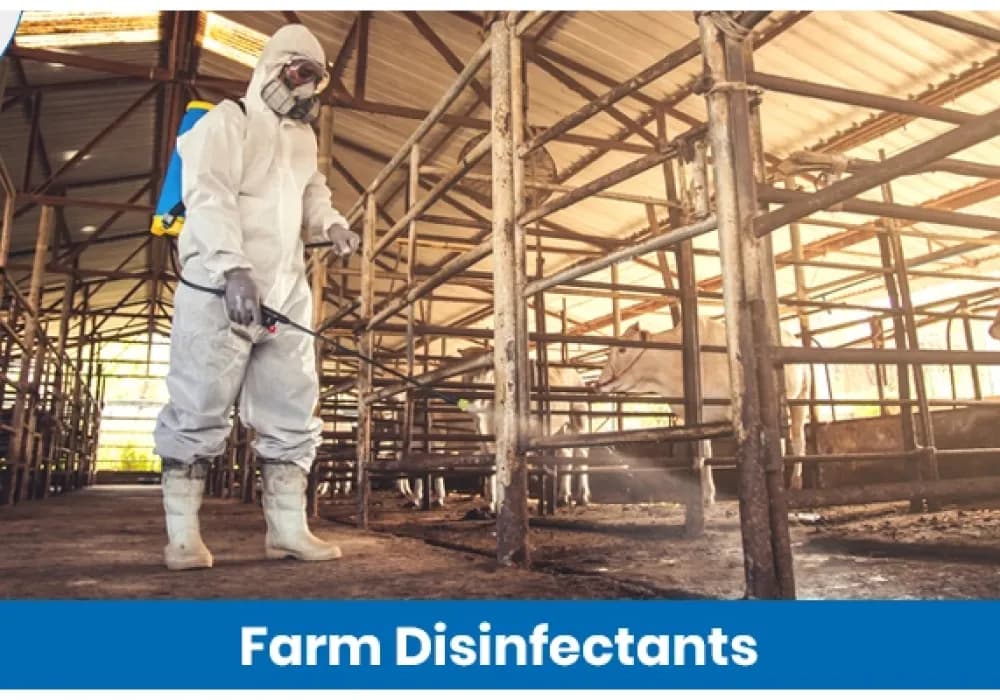The word sanitizer is now a nationwide, easily available product that has cemented itself since the year 2020. But did you hear about it before that? Maybe not. Sanitizer is now a well-known product we use daily, and it is a common example of a disinfectant. It treats any existing bacteria or microorganisms on our hands.
Imagine you noticing that your cows are falling sick one by one. The water that your cattle drink appears clean, but it contains microscopic bacteria. A basic carelessness related to cleaning can trigger a large wave of infection across your farm.
Incidents like these really force us to focus on disinfectants and sanitation. Such instances are common across the country, where farms lose crops and cattle due to untreated germs from soil, tools, and housing waste. Through this blog, we will understand what disinfectants are, their types, and how they sanitize both our crops and livestock.
What are Disinfectants in Agriculture?
Chemicals or natural solutions that kill or treat harmful microorganisms like bacteria, viruses, or fungi are called disinfectants. On farms, they protect crops, animals, and farmers from infections that spread through contaminated soil, water, or tools.
For example, if dairy farmers use untreated water to clean their milking machines, then harmful bacteria can contaminate the supplied milk. Through the use of approved disinfectants, you can prevent the spread of these pathogens, thereby ensuring food safety and animal health.
The role of a disinfectant isn't to cure a disease, but to primarily remove the source of infection. Disinfectants work either by breaking down the cellular wall of microorganisms or by disturbing their growth and reproduction cycle.
Types of Disinfectants Used in Agriculture
Chemical-based Disinfectants:
Chemical disinfectants are widely used on farms because they act quickly and target a broad range of microbes. However, they should be used carefully to avoid harm to the crops and animals. Here are some agricultural disinfectants used for different purposes:
Quaternary Ammonium Compounds or QACs:
They are effective against viruses and bacteria. They are also commonly used to clear farm equipment and farm surfaces.
Phenolic Disinfectants:
With phenol-based components, these are very strong and long-lasting. They are useful in livestock sheds and poultry houses.
Chlorine-based Disinfectants or Bleach:
This is a range that is affordable and has a faster action. Really suitable for pools and water tanks, these chlorine-based disinfectants can be disastrous if they are overused.
Formaldehyde Solutions:
Formaldehyde is extremely effective for sanitization but highly toxic, and is used only in controlled fumigation.
Needless to say, all these disinfectants are highly effective, but it is essential to always wear gloves and a mask when using them. Also, a major point of caution is the dilution ratio. Following the mixing guidelines is always a mature action.
Natural and Eco-Friendly Disinfectants:
Eco-friendly disinfectants are gaining popularity due to their safety and minimal environmental impact. Compared to chemicals, they are slower in effect, but sustainable in the long run. Here are some examples of natural disinfectants.
- Starting with neem extracts, which serve as a great example of a natural disinfectant. They are widely available in India and work as the best natural antibacterial and antifungal sprays.
- Following that, you have vinegar, also known as acetic acid, which can prevent fungal growth. It is also used for cleaning tools and small surfaces.
- Turmeric-based solutions are known to disinfect wounds on both human and animal bodies. They have natural antimicrobial properties and are used in traditional farming practices.
- Essential oils like Eucalyptus oil, tea tree oil, and citronella oil are extremely safe and hold milder disinfectant properties.
- The last on this list is Bio Disinfectants. These are made from naturally occurring bacteria and their products that target harmful microbes.
If you prefer organic practices or have an organic label, you can highly benefit from these natural disinfectants. They also maintain soil fertility and leave no harmful residue.
Role of Disinfectants in Preventing Crop and Animal Diseases
Disinfectants are not just cleaners like soaps. Rather, they can be looked at as a protective shield against diseases that threaten farm productivity. Here is how they work:
Crops:
Tools and soil carry fungal spores, such as those of Fusarium and Rhizoctonia. Disinfecting the seed trays, irrigation systems, and greenhouses can substantially reduce crop loss.
Animals:
Cow sheds, pigsties, and poultry houses are the optimal conditions for microbes to breed and spread. Regular use of disinfectants can significantly reduce the risk of mastitis in cows, foot-and-mouth disease in cattle, or Newcastle disease in poultry.
Water Sources:
Ponds and tanks often are homes to algae and bacteria. Disinfectants can ensure safe water for irrigation and livestock. Without proper sanitation, even if you buy high-yield seeds and nutritious manure, a healthy production cannot be guaranteed.
Safe Use of Disinfectants on Farms
When used properly, disinfectants can be lifesaving. However, unsafe use can harm soil health, animal health, and crop yields. Here are some best practices that you should follow:
- Check the recommended use, dilution, ratios, and concentrations.
- Organic matter or dirt can reduce the effectiveness of a disinfectant. It's ideal to always cleanse.
- To prevent direct exposure to your body, gloves, masks, and protective boots are highly advised.
- Overusing a single type of disinfectant for an extended period can lead to the development of resistance in microorganisms.
- You should spray the disinfectants away from stored cattle fodder or reaped grains, in order to avoid toxicity or contamination within the edibles.
- If you release a strong and toxic waste into an open water body used by everyone, then it can land you in trouble.
Following these steps ensures maximum safety and protection at minimum risk.
Conclusion
Farming is a battle against numerous factors, including weather, pests, and microbes that are invisible to the naked eye but have a significant impact on overall farming practices. By practicing proper sanitation with the correct disinfectant and care, you not only safeguard your crops but also protect domesticated animals and the families that depend on safe food. Always remember, clean farms are productive farms where sanitation is the strongest investment you can make.
FAQs

K SANJEEVA REDDY
CHIEF AGRONOMY OFFICER
Sanjeeva Reddy K. serves as the Chief Agronomy Officer at AGRIBEGRI TRADELINK PVT LTD, a role he stepped into in July 2025, where he oversees and manages agronomy expertise across the organization. He holds a Postgraduate degree in Agricultural Science from Tamil Nadu Agricultural University, India, and is a Certified Crop Advisor accredited by the Indian Society of Agri Professionals, in association with the American Society of Agri Professionals. With more than 20 years of experience in crop production, Reddy has built extensive expertise working across reputed agribusiness industries. A significant part of his career includes a decade-long tenure with the internationally recognized Indian brand MULTIPLEX, a leading Bangalore-based manufacturer and marketer of plant nutrients, where he played a key role in driving growth and innovation.


